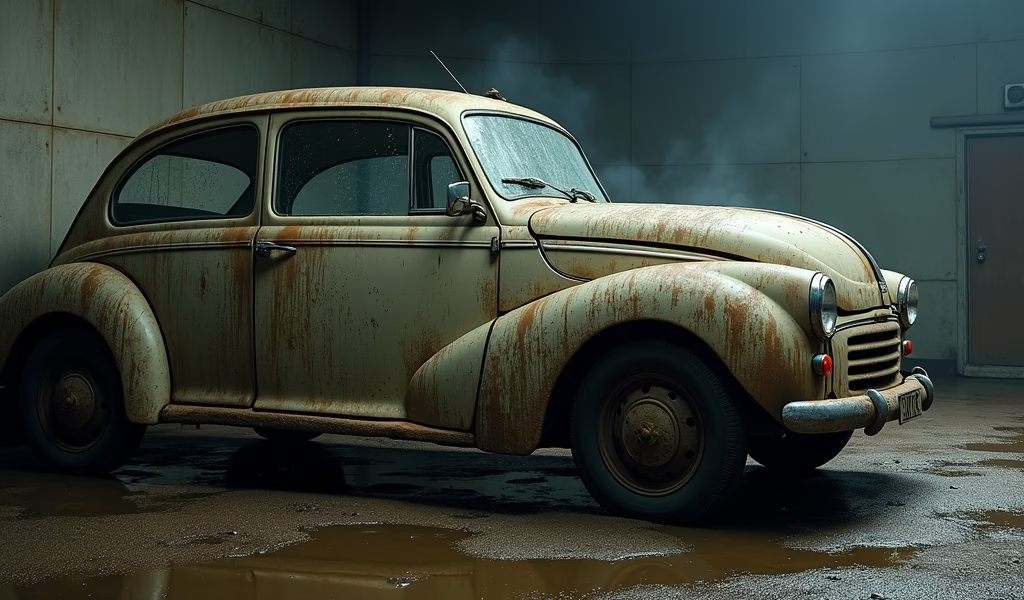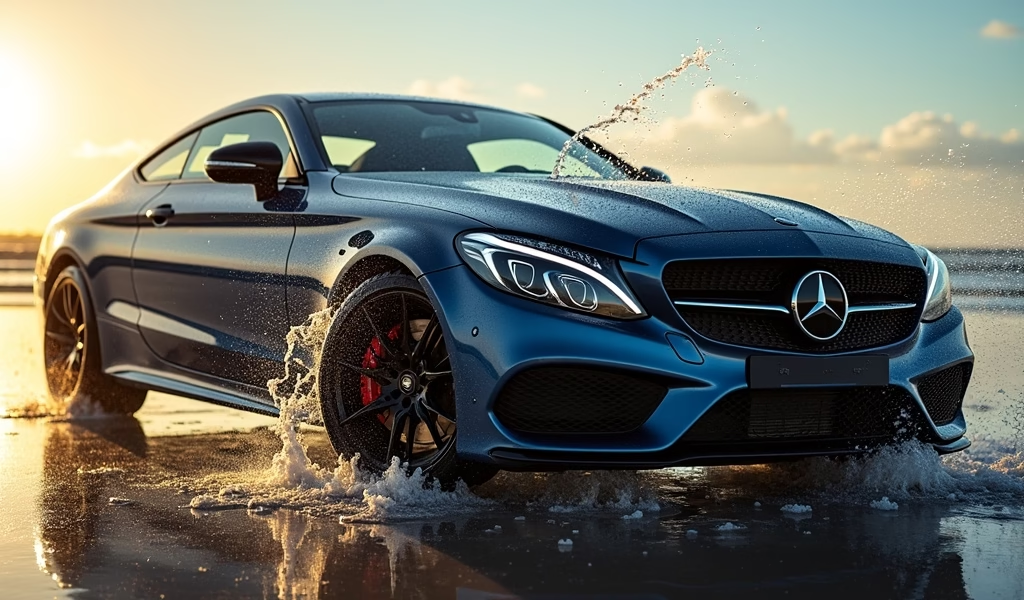Overview
The article provides seven essential car care strategies for Corpus Christi residents, emphasizing that regular washing every 1-2 weeks is crucial due to the corrosive effects of salt air on vehicles. It recommends specific local car washes, DIY techniques, protective coatings, and membership programs while highlighting the importance of undercarriage cleaning and seasonal considerations to preserve a vehicle’s appearance and value.
Table of Contents
- Understanding the Corpus Christi Environment
- Selecting the Right Car Wash Type
- Top-Rated Car Wash Locations in Corpus Christi
- Best Times to Wash Your Car
- DIY Car Washing Techniques
- Protecting Your Car Between Washes
- Membership and Loyalty Programs Worth Considering
- Conclusion
- Frequently Asked Questions
Living in the coastal paradise of Corpus Christi brings spectacular Gulf views and sea breezes, but it also delivers a silent assault on your vehicle’s finish. The salty sea air doesn’t just tickle your nose—it’s actively attacking your car’s paint and metal components day and night. As a seasoned automotive technician who’s seen countless coastal casualties roll into the shop, I can tell you that regular washing isn’t just about keeping up appearances—it’s critical preventative maintenance that can save you thousands in the long run.
The best Corpus Christi car wash approach combines understanding our unique environmental challenges with strategic cleaning techniques. Having repaired the aftermath of salt damage for over 15 years, I’ve gathered these seven professional tips to help your vehicle weather our beautiful but harsh coastal climate.
Understanding the Corpus Christi Environment
Corpus Christi’s coastal location creates a perfect storm of vehicle-damaging elements. Salt particles dance through the air like microscopic vandals, settling on your car’s surfaces and finding every nook and cranny. This isn’t just beach-day damage—even if you never dip a tire in the sand, your vehicle is constantly being seasoned like a steak.
The salt-air cocktail becomes even more potent when mixed with our high humidity, which helps these corrosive compounds cling to your vehicle. Then add our scorching summer sun, which accelerates chemical reactions and bakes contaminants into your paint. It’s like leaving your car in a slow-cooking salt bath—not exactly the recipe for maintaining that showroom shine.
This coastal conundrum means your washing strategy needs to be dramatically different from inland recommendations. While folks in San Antonio might get away with monthly washes, your Corpus Christi chariot needs attention at least every two weeks—more if you’re parked near the shore. Regular car washing isn’t just aesthetic maintenance here; it’s essential protection against our environment’s constant assault.
Selecting the Right Car Wash Type
When it comes to choosing your weapon against coastal corrosion, you’ve got several options, each with their own strengths and weaknesses.
Touchless automatic washes use high-pressure water jets and chemical cleaners without physical contact with your paint. They’re fantastic for removing loose salt without risking scratches, but they sometimes struggle with stubborn grime in textured areas. Think of them as a gentle power-washer—effective but not always thorough.
Soft-touch systems employ cloth or foam materials that physically contact your vehicle. These typically provide more comprehensive cleaning but carry a slight risk of surface marring if the equipment isn’t well-maintained or if previous vehicles left behind abrasive particles. It’s like getting your car scrubbed with giant, soapy mittens.
Self-service bays put you in control. For us gear-heads who prefer a hands-on approach, this option lets you target problem areas and use your preferred products. The downside? You’re at the mercy of potentially hard water and whatever cleaning supplies you bring along.
Full-service operations combine mechanical washing with human attention to detail. These establishments often offer hand-drying and spot treatments that machines simply can’t match. Yes, they’re pricier, but there’s no substitute for a trained eye identifying trouble spots before they become expensive problems.
For Corpus Christi vehicles specifically, I recommend a hybrid approach: regular touchless or soft-touch washes for maintenance, with monthly full-service treatments to address areas where salt loves to hide. This balanced attack keeps corrosion at bay without breaking the bank.

Top-Rated Car Wash Locations in Corpus Christi
After testing nearly every car wash in the Corpus area (my wife thinks I’m obsessed), I’ve compiled this shortlist of establishments that truly understand our unique coastal challenges:
Northside Options
- Ocean Breeze Auto Spa (5718 Everhart Rd)
- Standout feature: Their undercarriage blast uses a salt-neutralizing formula that penetrates where regular washes can’t reach
- Price range: $12-25
- Pro tip: Their “Coastal Shield” package includes a protective polymer coating that repels salt for weeks
Southside Selections
- Shoreline Shine (2233 Airline Rd)
- Standout feature: Hand-drying with microfiber towels eliminates water spots that can etch into clear coat
- Price range: $15-40
- Pro tip: Their ceramic coating add-on is pricey ($40) but provides up to 6 weeks of protection
Downtown Destinations
- Bay Area Auto Bath (401 N Water St)
- Standout feature: Uses softer water than competitors, reducing mineral deposits
- Price range: $10-30
- Pro tip: Their early bird special (before 9am) knocks $5 off premium washes
Flour Bluff Finds
- Coastal Cleaners (10241 SPID)
- Standout feature: Open until midnight, perfect for shift workers
- Price range: $8-35
- Pro tip: Their military discount (15%) makes their top-tier wash one of the best values in town
What sets these operations apart isn’t just cleaning quality—it’s their understanding of Corpus Christi’s specific challenges. They’ve adapted their processes to address salt exposure, use appropriate chemicals for our water conditions, and train staff to spot coastal-specific issues. When choosing between Houston car wash options and local establishments, our homegrown operations better understand the Gulf Coast’s unique demands.
Best Times to Wash Your Car
Timing isn’t just important for comedy—it’s crucial for effective car washing in Corpus Christi. Our seasonal patterns create distinct challenges throughout the year.
Spring brings pollen season, where that yellowish dust competes with salt for space on your paint. The combination creates a sticky residue that can become semi-permanent if left untreated. During peak pollen (March-April), increase your washing frequency to weekly if possible.
Summer cranks up both temperature and humidity, creating the perfect environment for salt to become more aggressive. The increased evaporation rate means mineral deposits form faster on your paint. Aim for early morning or evening washes to prevent soap from drying too quickly in the intense heat.
Fall offers a slight reprieve, but don’t get complacent. This is the perfect time to deep clean and apply protective treatments before winter. Many overlook this opportunity, but autumn’s milder conditions make it ideal for thorough detailing.
Winter, while mild by national standards, brings its own challenges. Fewer rainstorms mean salt and contaminants build up more between natural rinses. The lower washing frequency typical during winter months can lead to accumulative damage.
For optimal results, avoid washing during rush hours (7-9am and 5-7pm) when facilities are crowded, leading to rushed services. The sweet spot is mid-morning (9-11am) or late afternoon (3-5pm) on weekdays, when you’ll get better attention and more thorough cleaning. And always check the forecast—washing right before rain is like sweeping your driveway during a sandstorm.
Living in Corpus Christi means adopting this washing frequency guideline:
- Vehicles parked within 1-2 miles of saltwater: Weekly washing is essential
- Vehicles in more inland areas: Every 10-14 days
- After beach visits: Rinse thoroughly within 24 hours, full wash within 48
- During pollen season: Increase frequency by 30-50%
DIY Car Washing Techniques
Sometimes the best car wash comes from your own two hands. If you’re rolling up your sleeves for a DIY session, here’s how to make it count in our coastal climate.
First, gather the right supplies—this isn’t the place to cut corners. You’ll need:
- Two buckets (one for soap solution, one for rinsing your mitt)
- Grit guards for both buckets to trap abrasives
- pH-neutral car wash soap specifically formulated for salt exposure
- Microfiber wash mitts and drying towels
- Wheel-specific brushes (salt loves wheel wells)
- A water filtration system if possible (reduces mineral spotting)
The process matters just as much as the products. Follow this Corpus Christi-specific sequence:
- Find shade and ensure all surfaces are cool to touch
- Pre-rinse thoroughly to remove loose salt and debris
- Apply salt neutralizer to lower panels, wheel wells, and undercarriage
- Wash from top down using minimal pressure (let the soap do the work)
- Pay extra attention to seams, trim, and crevices where salt accumulates
- Rinse thoroughly—any remaining soap becomes a magnet for new contaminants
- Dry immediately with clean microfiber towels to prevent water spots
- Apply a spray sealant while the surface is still slightly damp for maximum adhesion
The biggest DIY mistake I see? Using household dish soap. That kitchen staple strips protective wax faster than our coastal sun, leaving your paint vulnerable. Similarly, using a single bucket redeposits grit onto your paint, creating microscopic scratches that dull your finish over time.
Perhaps most critical for Corpus Christi vehicles is thorough undercarriage rinsing. Consumer Reports confirms that salt damage starts underneath your vehicle, where it’s least visible until serious corrosion occurs. Consider investing in an undercarriage sprayer attachment—it’s the best $30 you’ll spend on coastal car care.

Protecting Your Car Between Washes
Even with regular washing, your vehicle faces Corpus Christi’s salty assault 24/7. The secret weapon? Creating a protective barrier that stands guard between wash days.
Let’s talk coating options, starting with traditional carnauba wax. This natural product creates a warm, deep shine with modest protection lasting 4-6 weeks. It’s like putting on sunscreen with SPF 15—better than nothing, but not enough for our intense environment.
Synthetic sealants offer significantly improved durability, protecting for 3-6 months with a slightly cooler appearance. Think of them as SPF 30—a solid choice for most drivers with reasonable longevity.
Ceramic coatings represent the gold standard, forming a semi-permanent barrier that can last 1-5 years depending on quality and application. These nanotechnology marvels are the SPF 100 of paint protection—providing superior resistance to salt, UV rays, and environmental contaminants. While professional application is recommended (and pricey at $500-1500), DIY options have improved dramatically in recent years.
For Corpus Christi vehicles, I recommend at minimum a quality synthetic sealant applied quarterly, with serious consideration for professional ceramic coating if your budget allows. The investment pays dividends in preserved resale value and reduced maintenance costs.
Where you park matters almost as much as what you apply. Garage storage provides complete protection from the elements and should be your first choice if available. Covered parking significantly reduces UV exposure and direct salt deposition. For those without covered options, a breathable, weather-resistant car cover designed for coastal environments offers substantial protection, particularly for vehicles that sit unused for extended periods.
Between major protection applications, incorporate these quick maintenance habits:
- Keep a spray bottle of detail spray and microfiber cloth in your trunk for spot cleaning
- Wipe door jambs and rocker panels weekly—these often-forgotten areas collect salt rapidly
- Apply a water repellent treatment to windows monthly to improve visibility during rain
- Consider using protective film (clear bra) on front-facing surfaces most vulnerable to damage
Remember, prevention is infinitely easier than restoration. Once salt corrosion takes hold, repairs become exponentially more expensive. As NADA Guides notes, proper protection can add years to your vehicle’s service life and thousands to its resale value.
Membership and Loyalty Programs Worth Considering
With the frequent washing that Corpus Christi vehicles require, those individual wash fees add up faster than barnacles on a pier piling. That’s where membership programs transform from seeming luxury to smart financial decision.
Let’s crunch some numbers: Washing twice monthly at $20 per premium wash totals $480 annually. Most unlimited membership programs range from $25-40 monthly ($300-480 annually), potentially saving hundreds while encouraging more frequent washing. It’s like buying in bulk—the unit cost drops dramatically.
Not all programs offer equal value, however. Here’s my breakdown of the best local membership options:
- Ocean Breeze’s “Coastal Protection Plan” ($39.99/month)
- Includes unlimited top-tier washes with undercarriage treatment
- One free detail service quarterly (normally $100+)
- Family plan option adds 50% discount for additional vehicles
- Shoreline Shine’s “Gulf Guardian” ($34.99/month)
- Unlimited premium washes with hot wax and tire shine
- Free vacuums and mat cleaning
- 10% discount on detail services
- Coastal Cleaners’ “Salt Fighter” ($29.99/month)
- Unlimited basic washes
- 50% off premium wash upgrades
- No contract requirement—pause or cancel anytime
The true membership value often lies in the extras. Look for programs that include vacuum access, mat cleaning, tire treatments, and occasional premium services. Some local washes have partnered with quick lube services to offer discounted oil changes to members—bundling routine maintenance conveniences.
Before committing, ask about any fine print like blackout periods or location restrictions. Most San Antonio car washes and Corpus Christi operations now offer month-to-month memberships without long-term contracts, allowing you to test-drive the service before making a long-term commitment.
For families with multiple vehicles, inquire about multi-car discounts—many locations offer substantial savings (30-50% off) for additional vehicles under the same household.
Conclusion
Keeping your ride spotless in Corpus Christi isn’t just about turning heads—it’s about protecting your investment from our uniquely challenging coastal environment. Salt doesn’t discriminate between luxury vehicles and daily drivers; it attacks them all with equal enthusiasm. But armed with these seven professional tips, you’re now equipped to fight back effectively.
Understanding our coastal climate, selecting the right washing approach, finding quality local facilities, timing your washes strategically, mastering DIY techniques, implementing protective measures, and leveraging membership programs—this comprehensive strategy creates a formidable defense against the Gulf’s salty assault.
Remember that consistency trumps intensity when it comes to vehicle care in our region. A regular maintenance rhythm will preserve your vehicle’s appearance, functionality, and value far more effectively than occasional deep cleanings after damage has begun.
Ready to give your vehicle the protection it deserves? Start with a thorough wash this week, apply a quality protective coating, and consider which membership program might best fit your needs and budget. Your car will thank you with years of reliable service and preserved resale value. And isn’t that worth a little regular attention?
Don’t let salt win the battle for your vehicle’s future—take action today and keep that coastal shine going strong for years to come!
Frequently Asked Questions
How often should I wash my car in Corpus Christi?
Vehicles within two miles of saltwater should be washed weekly, while those in more inland areas can go 10-14 days between washes. Always wash within 48 hours after beach trips or salt exposure.
Is a touchless or soft-touch car wash better for my vehicle?
Touchless washes minimize scratch risks but may miss stubborn grime, while soft-touch provides more thorough cleaning but carries slight risk of surface marring. For coastal vehicles, a combination approach works best—touchless for regular maintenance and soft-touch monthly for deeper cleaning.
Are car wash memberships worth the cost in Corpus Christi?
Absolutely—with the frequent washing needed in our coastal environment, memberships typically pay for themselves if you wash just twice monthly. Most programs save $15-20 monthly while encouraging more consistent maintenance.
What’s the best DIY car wash soap for Corpus Christi’s salty environment?
Look for pH-neutral soaps specifically formulated with salt neutralizers like Meguiar’s Gold Class or Chemical Guys Citrus Wash. Avoid dish soaps and general-purpose cleaners that strip protective waxes and sealants.
How can I protect my car’s undercarriage from salt damage?
Select car washes that offer undercarriage spray treatments and consider applying a dedicated undercarriage protective spray quarterly. Regular freshwater rinsing of the underside after rain or heavy dew also helps flush accumulated salt.


Pingback: Best Houston Car Wash: 7 Pro Shine Tips - knowsyourcar.com